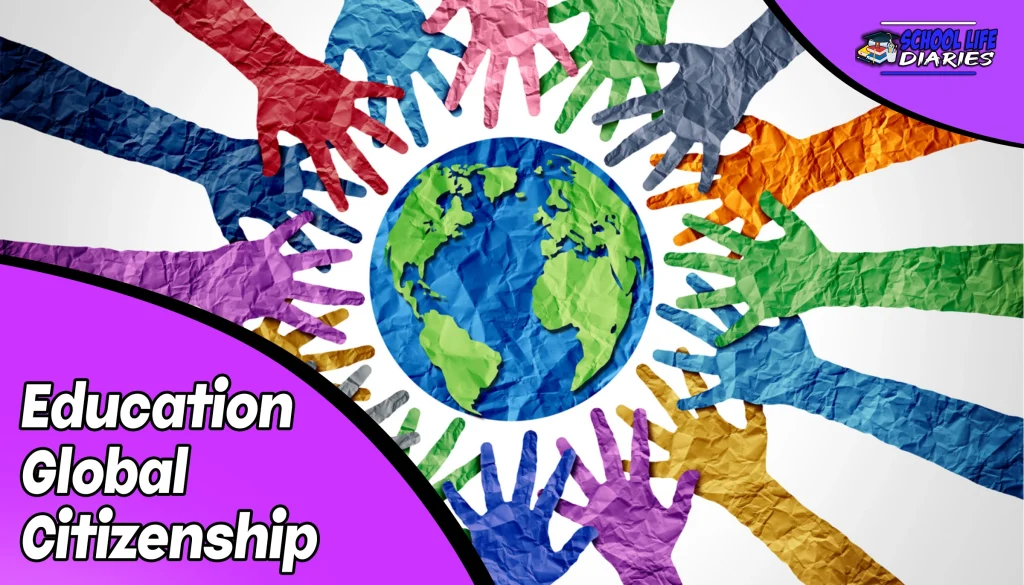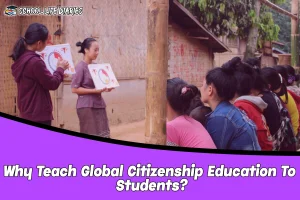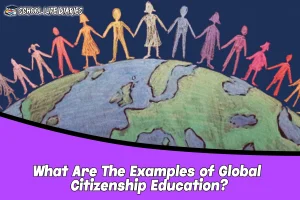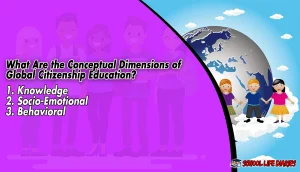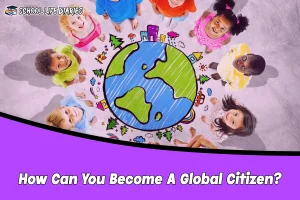Global Citizenship Education is an emerging concept that has gained significant traction in recent years. It refers to the process of teaching students about global issues and encouraging them to participate actively in finding solutions to these problems.
The aim of such education is to help young people develop a sense of responsibility towards their fellow humans, regardless of their nationality or cultural background. In today’s interconnected world, where political borders are becoming increasingly irrelevant, it is essential for individuals to become global citizens.
What Is Global Citizenship Education?
Global Citizenship Education entails the cultivation of a sense of responsibility toward promoting social justice, equity, and sustainability on a global level through critical thinking, empathy, and active engagement. It is an educational approach that emphasizes the interconnectedness of human beings across national boundaries and cultures.
Through this curriculum, students develop their understanding of complex global issues such as poverty, inequality, conflicts, and environmental degradation. The importance of Global Citizenship Education lies in its potential to equip learners with the necessary skills to become responsible citizens who can make informed decisions in a rapidly changing world.
This type of education helps students acquire knowledge about different cultures and traditions while fostering respect for diversity. It promotes participation in civic activities that address local and global challenges.
Why Teach Global Citizenship Education To Students?
Teaching students about various cultures, societies, and global issues fosters a sense of interconnectedness and understanding that can lead to greater empathy and social responsibility. This is why Global Citizenship Education (GCE) is becoming increasingly important in today’s world. GCE provides students with the skills they need to navigate an ever-changing global landscape and engage with diverse perspectives.
It helps them develop cultural awareness, which is crucial for effective communication, collaboration, and problem-solving across different cultures. GCE also instills a sense of social responsibility in students. By learning about global issues such as poverty, inequality, climate change, and human rights violations, students are motivated to take action to address these challenges.
How Can Global Citizenship Education Help Students Develop Critical Thinking and Problem-Solving Skills?
Developing critical thinking and problem-solving skills can be facilitated by exposing students to diverse perspectives and global issues. Global Citizenship Education (GCE) provides opportunities for students to engage in real-world scenarios, learn about cross-cultural communication, and explore ethical decision-making.
By immersing themselves in different cultural contexts, students can gain a better understanding of the complexity of issues facing our world today. Global awareness is an important aspect of GCE that helps students develop critical thinking skills. Through exposure to different cultures, beliefs, and practices, students become more aware of the interconnectedness of our world.
They begin to recognize how global issues such as climate change or poverty affect people all over the world. This broad understanding enables them to analyze problems from multiple perspectives and identify potential solutions. Community engagement is another crucial component of GCE that fosters critical thinking and problem-solving skills.
Engaging with local communities allows students to understand their needs and challenges first-hand. It also offers opportunities for collaboration with others who have different backgrounds and experiences. By working together towards a common goal, students learn how to negotiate differences while developing empathy and respect for other viewpoints.
What Are The Benefits of Incorporating Global Issues Into Classroom Discussions and Activities?
Incorporating global issues into classroom discussions and activities can broaden students’ understanding of the world and enhance their analytical skills. Real-world examples are an effective tool in achieving this goal, as they provide students with a tangible context to apply their critical thinking and problem-solving skills.
By examining issues such as poverty, inequality, and environmental degradation, students can develop a sense of social responsibility that goes beyond their immediate surroundings. Through classroom discussions and activities that address global issues, students can learn to communicate effectively with people from diverse backgrounds.
This not only enhances their interpersonal skills but also prepares them for future career opportunities in a globalized economy. As climate change continues to be a pressing issue across the globe, it is crucial for individuals to understand how their actions impact the environment.
What Are The Examples of Global Citizenship Education?
Examples of global citizenship education are numerous and can be implemented in various teaching strategies and classroom activities. One effective way to promote cultural awareness and global engagement is through international exchange programs that allow students to immerse themselves in different cultures, learn new languages, and build relationships with people from diverse backgrounds.
These programs offer an opportunity for students to develop a sense of empathy towards others, expand their worldview, and become more open-minded individuals. Another way to incorporate global issues into the classroom is through community service projects that address social problems at the local or global level. For instance, students can participate in fundraising events for organizations that work towards poverty alleviation or environmental conservation.
By working on such projects, learners can recognize the interconnectedness of all human beings and understand how their actions can impact other people’s lives positively. Exploring diverse cultural perspectives through literature and media is an effective tool for promoting cultural sensitivity among students.
Teachers can assign readings from writers outside of their country or culture to expose learners to different ways of life, norms, values, beliefs, and attitudes. Watching films or documentaries about other countries’ histories or current events helps learners gain a better understanding of complex issues such as globalization or migration.
What Are the Conceptual Dimensions of Global Citizenship Education?
The conceptual dimensions of Global Citizenship Education (GCE) are crucial for understanding its goals and objectives. These dimensions include knowledge, socio-emotional development, and behavioral changes. Knowledge refers to the acquisition of global awareness and understanding of complex issues such as poverty, inequality, and environmental sustainability.
1. Knowledge:
A comprehensive understanding of global issues is essential for fostering global citizenship through education. Knowledge acquisition plays a crucial role in developing cross-cultural understanding and global awareness, which are key components of intercultural competence. By gaining knowledge about different cultures, students can develop empathy and respect toward people who come from diverse backgrounds.
Education that prioritizes knowledge acquisition as a means to promote social responsibility and intercultural competence can help foster a generation of global citizens who value freedom and are equipped to tackle the complex issues facing our world today.
2. Socio-Emotional:
Developing socio-emotional skills is crucial for individuals to effectively interact and communicate with people from diverse backgrounds. Empathy development, conflict resolution, self-awareness, relationship building, and mindfulness practice are the key components of socio-emotional learning.
These skills enable individuals to understand their own emotions as well as those of others, which in turn helps them build healthy relationships with people from different cultures and backgrounds. Empathy development involves understanding and sharing the feelings of others. This skill allows individuals to connect with people on a deeper level and respond appropriately to their needs.
Conflict resolution is another important aspect of socio-emotional learning that helps individuals develop effective communication strategies to resolve conflicts peacefully. Relationship-building skills help create positive connections between people who have different cultural backgrounds, while mindfulness practice enables individuals to be present and attentive during social interactions.
3. Behavioral:
Behavioral skills play a significant role in shaping an individual’s actions and responses toward diverse cultures, making it a critical component of global communication. One of the most crucial behavioral challenges that individuals face when engaging with people from different cultural backgrounds is cultural sensitivity.
Cultural sensitivity refers to the ability to understand and appreciate the values, beliefs, customs, and practices of another culture without imposing one’s own cultural perspective. Developing this skill requires empathy development, which involves putting oneself in others’ shoes and understanding their perspectives.
Benefits of Global Citizenship Education?
Global Citizenship Education provides numerous advantages, including fostering intercultural understanding, promoting empathy and respect for diverse perspectives, cultivating critical thinking skills, preparing individuals to become active global citizens, and increasing awareness of social justice issues. One key benefit of Global Citizenship Education is the development of cultural awareness.
Through this type of education, learners are exposed to various cultures from around the world. This exposure helps them understand different ways of life and develop a deeper appreciation for diversity. Another advantage that Global Citizenship Education offers is its promotion of social responsibility. Learners are encouraged to recognize their role in contributing to the community as well as society at large.
They learn about the interconnectedness between different regions and understand how their actions can affect people across borders. As such, they become more mindful of their impact on others and strive towards creating positive change. Global Citizenship Education prepares individuals for political engagement by equipping them with critical thinking skills necessary for navigating complex global issues.
How Can You Become A Global Citizen?
Having discussed the benefits of global citizenship education, it is important to highlight how individuals can become global citizens themselves. Becoming a global citizen involves developing an understanding and appreciation of different cultures, languages, and traditions.
This ultimately leads to greater cultural awareness and sensitivity towards others from diverse backgrounds. One way to become a global citizen is through travel. Traveling exposes individuals to different ways of life and provides an opportunity for learning about new cultures.
It broadens perspectives and challenges preconceptions by allowing individuals to experience firsthand the nuances that make each culture unique. Another way to become a global citizen is by developing language proficiency. Language barriers can often hinder communication between people from different parts of the world.
Thus, being able to speak multiple languages not only facilitates communication but also demonstrates respect for other cultures. Volunteering abroad is one way in which individuals can build such relationships while making meaningful contributions towards improving communities in need.
Through travel, language proficiency, building international relationships, and volunteering abroad among other things; anyone can develop the skills needed to navigate our increasingly interconnected world with ease and grace.
How Can Teachers Address Sensitive or Controversial Global Issues In The Classroom?
Addressing sensitive or controversial global issues in the classroom can be a daunting task for teachers. However, it is essential for promoting critical thinking and nurturing a deeper understanding of diverse perspectives among students. Facilitating dialogue is an effective way to address these issues while creating a safe learning environment for students to express their thoughts and opinions.
Cultural sensitivity should also be emphasized when discussing sensitive global topics in the classroom. Teachers need to be aware of cultural differences and avoid promoting stereotypes or biased viewpoints that could offend some students. Media literacy skills should also be incorporated into the curriculum, as media sources can often present information with inherent biases that can influence students’ beliefs and attitudes.
Empathy-building techniques such as role-playing exercises or storytelling activities can help students understand different perspectives on global issues. Active listening is another crucial skill that needs to be developed by both teachers and students alike. It involves paying attention to what others are saying without judgment, clarifying any misunderstandings, and responding thoughtfully.
By incorporating these approaches, teachers can create an inclusive learning environment where all voices are heard and respected, fostering not only global citizenship but also mutual respect among individuals from different backgrounds.
Conclusion:
Global Citizenship Education is an essential aspect of learning that aims to instill in students an awareness and understanding of global issues, cultural diversity, and social responsibility. By integrating global citizenship education into the curriculum, students are exposed to various perspectives and experiences that can help them become critical thinkers and problem-solvers.
Moreover, it fosters respect for different cultures, promotes empathy toward others’ struggles, and encourages a sense of responsibility toward making positive changes in society. Incorporating global issues into classroom discussions allows students to gain a broader perspective on how these issues affect people worldwide. This approach enables learners to develop their research skills as they explore international policies that address global challenges.
Furthermore, it enhances communication skills as they engage in respectful dialogue with peers from different backgrounds. Through this form of education, we can cultivate individuals who not only understand but also embody the values of respect for diversity and social justice – essential traits needed for effective collaboration across nations.

